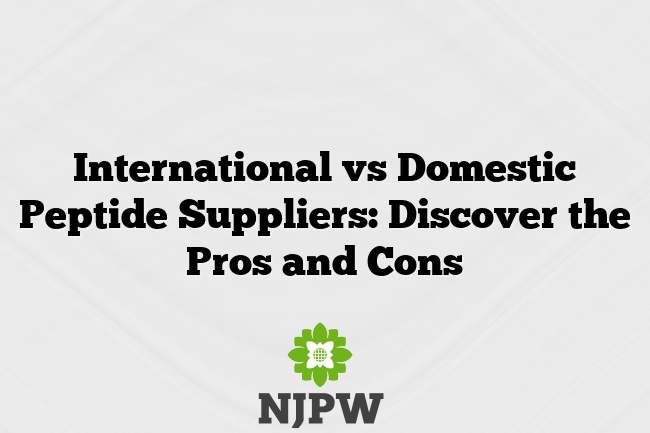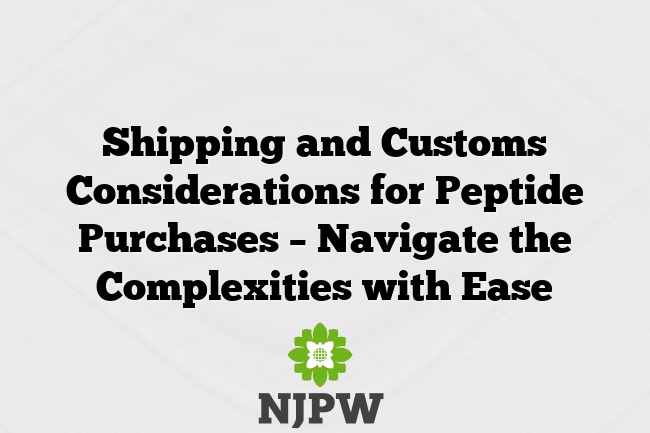International vs Domestic Peptide Suppliers: Discover the Pros and Cons

Navigating the complex world of peptide suppliers can be a daunting task, but understanding the key differences between domestic and international options can help you make an informed decision. Whether you’re a researcher, a product developer, or simply someone curious about the latest advancements in this field, this comprehensive guide will equip you with the knowledge to evaluate your options and find the right peptide supplier for your needs.
| Feature | Domestic Peptide Suppliers | International Peptide Suppliers |
|---|---|---|
| Quality Assurance | Rigorous testing and quality control protocols | Varying levels of quality assurance, requiring thorough vetting |
| Regulatory Compliance | Adhere to strict local and national regulations | Compliance standards may differ across countries |
| Shipping and Delivery | Faster and more reliable delivery times | Potential for longer transit times and customs delays |
| Cost | Prices may be higher due to stricter regulations | Potential for lower prices, but with added risks |
What are Peptide Suppliers?
Peptide suppliers are companies that specialize in the manufacturing, purification, and distribution of peptides – short chains of amino acids that have a wide range of applications in the fields of research, pharmaceuticals, and biotechnology. These suppliers play a crucial role in providing researchers, scientists, and product developers with the high-quality peptides they need to advance their work.
Comparing Domestic vs. International Peptide Suppliers
When it comes to sourcing peptides, researchers and companies have the option to work with domestic or international suppliers. Domestic suppliers are located within the same country or region as the customer, while international suppliers are based in other parts of the world. Each option presents its own set of advantages and challenges that must be carefully considered.
Quality Assurance Practices of the Compound
One of the primary factors to consider when selecting a peptide supplier is the quality assurance practices they have in place. Domestic suppliers are often subject to stricter regulatory oversight and must adhere to rigorous testing protocols to ensure the purity, potency, and stability of their peptide products. International suppliers may have varying levels of quality control, which can make it more challenging to verify the integrity of the compounds.
Regulatory Compliance and Licensing
Regulatory compliance is another critical aspect when choosing a peptide supplier. Domestic suppliers are typically well-versed in navigating the local and national regulations governing the production, storage, and distribution of peptides. International suppliers, on the other hand, may be subject to different regulatory frameworks, which can introduce additional complexities and potential risks.
Shipping and Delivery Considerations
The logistics of shipping and delivery can also play a significant role in the selection process. Domestic suppliers generally offer faster and more reliable delivery times, as the peptides do not have to navigate international borders and customs procedures. International suppliers may be able to provide more competitive pricing, but the extended transit times and potential for customs delays can be a concern.
Cost Differences and Value Proposition
The cost of peptides can vary significantly depending on the supplier and their location. Domestic suppliers may charge higher prices due to the stricter regulatory requirements and quality control measures they must adhere to. International suppliers may be able to offer more competitive pricing, but the added risks and potential for quality issues must be carefully weighed.
Benefits of Working with Domestic Suppliers
Working with a domestic peptide supplier can provide several advantages, including:
– Faster and more reliable delivery times
– Easier to navigate regulatory compliance and licensing requirements
– Greater transparency and accountability in quality assurance practices
– Established relationships and familiarity with local industry standards
Advantages of International Peptide Sources
While there are risks associated with international peptide suppliers, there are also potential benefits, such as:
– Access to a wider range of peptide products and specialized compounds
– Opportunity to leverage lower production costs in certain regions
– Potential for more competitive pricing, depending on the supplier and location
Mitigating Risks When Sourcing Overseas
When considering international peptide suppliers, it is crucial to implement robust risk mitigation strategies, such as:
– Conducting thorough due diligence on the supplier’s credentials, quality control measures, and regulatory compliance
– Requiring comprehensive documentation and certification of the peptide compounds
– Implementing stringent testing protocols to verify the quality and purity of the received peptides
– Establishing clear communication channels and contingency plans for potential shipping or customs delays
Factors to Consider When Choosing a Supplier
Selecting the right peptide supplier, whether domestic or international, requires a careful evaluation of several factors, including:
– Quality assurance and testing protocols
– Regulatory compliance and licensing
– Shipping and delivery timelines
– Cost and value proposition
– Supplier reputation and track record
– Availability of specialized peptide products
– Responsiveness and customer support
By weighing these considerations, you can make an informed decision that aligns with your specific needs and ensures the integrity of your research, product development, or clinical applications.
Conclusion
Navigating the world of peptide suppliers can be a complex undertaking, but by understanding the key differences between domestic and international options, you can make an informed decision that best serves your needs. Whether you prioritize quality assurance, regulatory compliance, delivery times, or cost-effectiveness, there is a peptide supplier out there that can provide the solutions you require. By carefully evaluating your options and implementing robust risk mitigation strategies, you can unlock the full potential of peptides and drive innovation in your field.
Frequently Asked Questions
What are the main differences between domestic and international peptide suppliers?
The primary differences between domestic and international peptide suppliers lie in the areas of quality assurance, regulatory compliance, shipping and delivery, and pricing. Domestic suppliers typically offer more rigorous quality control, easier regulatory navigation, and faster delivery, while international suppliers may provide more competitive pricing but come with added risks and complexities.
How can I ensure the quality and purity of peptides sourced from an international supplier?
To mitigate the risks associated with international peptide suppliers, it’s crucial to conduct thorough due diligence, require comprehensive documentation, and implement stringent testing protocols. This includes verifying the supplier’s credentials, quality control measures, and regulatory compliance, as well as independently testing the received peptide compounds to confirm their purity and integrity.
What factors should I consider when choosing a peptide supplier?
When selecting a peptide supplier, key factors to consider include quality assurance practices, regulatory compliance, shipping and delivery timelines, cost and value proposition, supplier reputation and track record, availability of specialized peptide products, and the level of responsiveness and customer support.






